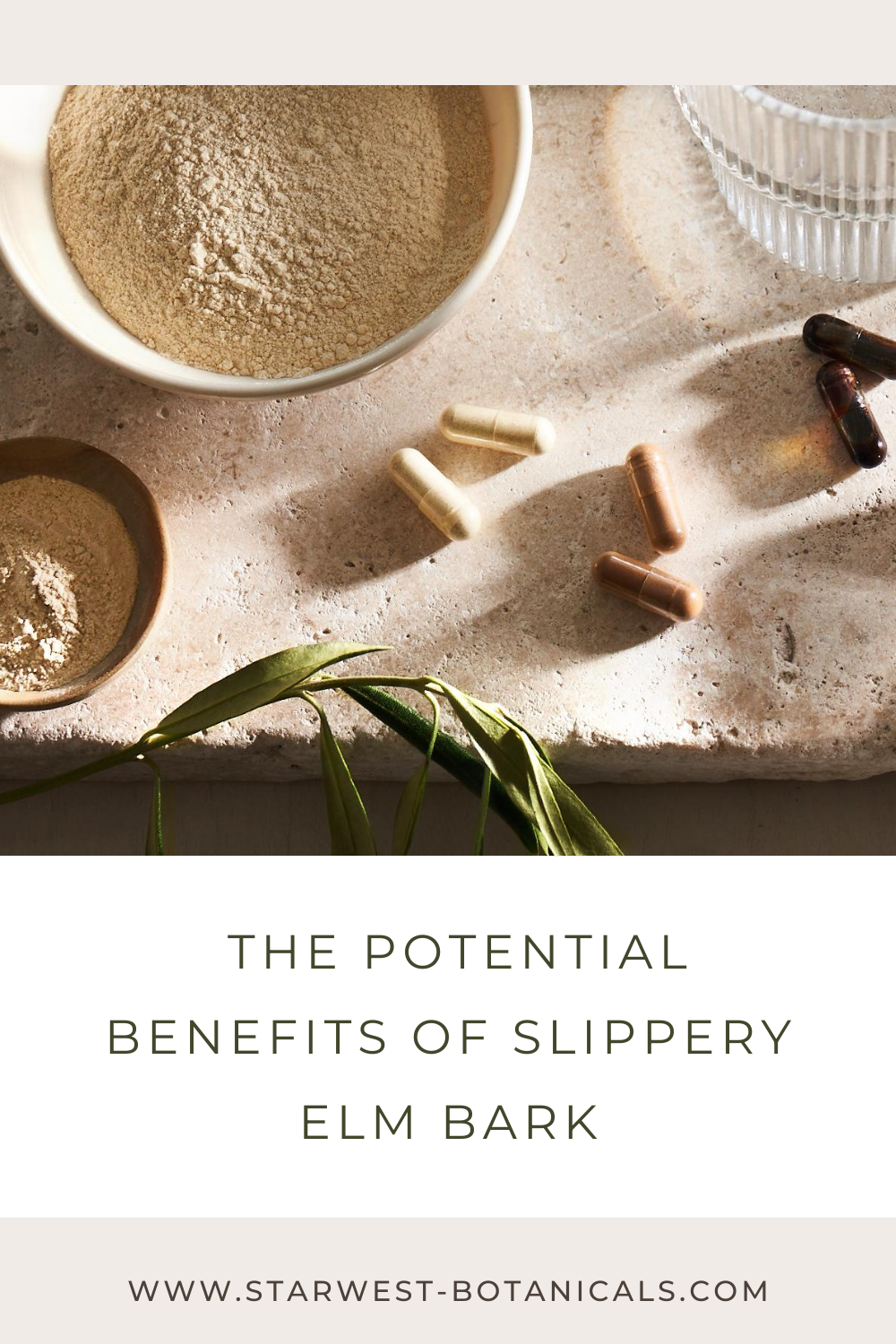The Potential Benefits of Slippery Elm | Starwest Botanicals
Posted by Daniel Powers on 06-06-2023

The Potential Benefits of Slippery Elm | Starwest Botanicals
Slippery elm is a natural remedy made from the inner bark of the elm tree that’s been used in traditional medicine for hundreds of years.
Slippery elm bark is rich in mucilage that, when combined with water, creates a slippery, mucus-like substance that soothes and nourishes the digestive tract. It also coats the mucous membranes - which can provide soothing comfort.
Slippery elm is commonly used to make tea (click here to see our full lineup of slippery elm products).
In this article, we will look at the health benefits of slippery elm bark and how to add it to your diet.
Slippery Elm Overview:
Slippery elm is a tree in the Ulmus family. It was originally native to eastern North America. The scientific name for this herb is Ulmus rubra.
As noted above, slippery elm bark is rich in mucilage. Mucilage, which is composed mostly of polysaccharides, creates a slippery substance that, when consumed, helps to soothe and comfort mucous membranes (throat, digestive tract, etc..).
As such, slippery elm is considered a “demulcent” herb, that is a herb that has a cooling, soothing, and relaxing effect on the body.
This tree bark was a popular herb in Native American medicine. It was traditionally used to help with gastrointestinal tract discomfort. In fact, some even call this herb the “king of digestive herbs”.
Slippery elm was listed in the United States Pharmacopeia from 1820-1936 as a demulcent. It is important to note that American settlers learned about the uses of this tree from Native Americans.
Additionally, this tree has a distinctly American history in that it was used in poultices for gunshot wounds by physicians during the American Revolution. Fun fact: Slippery elmwood was also used to make the yoke of the Liberty Bell.
This herb is also popular for canine health. Read our article here on the benefits of slippery elm powder for dogs.

Potential Health Benefits of Slippery Elm Bark:
Slippery elm is said to benefit the body in a variety of different ways. Below is a review of the top traditional and research-backed benefits of slippery elm bark.
1. May Help Support Digestive Health
Slippery elm has been used as a traditional herb to soothe the digestive tract. It’s thought to do this by soothing the lining of the stomach and intestines, which helps to reduce irritation and promote comfort.
A small clinical trial found that slippery elm helped to improve digestive function and comfort in 31 individuals.
Another study discovered that slippery elm may help to support gut health through its antioxidant content.
There is also evidence that suggests that slippery elm may help to balance the gut microbiome. A study found that slippery elm helped to balance “good” bacteria and reduce harmful gut bacteria.
Traditional herbalist Maude Grieve notes that slippery elm bark “makes an excellent drink in cases of irritation of the mucous membrane of the stomach and intestines”.
2. May Help Soothe The Upper Respiratory Tract
The mucilage content in slippery elm helps to create a soothing layer on the mucus membranes in the throat and esophagus. This coating can provide soothing relief which is why slippery elm is commonly found in throat lozenges and teas.
More research is needed to fully understand the potential health benefits of slippery elm for respiratory health.
3. Urinary System Comfort
Slippery elm has also been used as a traditional herb to soothe the urinary tract.
This hasn’t been proven by research, human clinical trials need to be conducted. However, anecdotal evidence indicates that slippery elm may help with urinary system discomfort.
Slippery Elm Sustainability:
Long-term sustainability is a major topic for slippery elm bark. This herb is on the United Plant Savers list of at-risk herbs.
This herb is endangered due to two factors, 1) overharvesting and 2) Dutch elm disease. Elm trees were at one point a prolific tree found throughout the United States, but populations have declined in recent years,
Harvesting the inner bark of the elm tree can kill the entire tree. Thus buying from ethical, sustainably grown sources is key when buying slippery elm.
Alternative herbs to use that may have similar health benefits include:
How To Add Slippery Elm Bark To Your Diet:
Based on the health benefits listed above, adding slippery elm to your diet is an easy decision - especially if you're looking to soothe your digestive tract.
So what's the best way to add slippery elm bark to your diet?
The best way to incorporate slippery elm into your diet is by taking slippery elm tea or by making a slippery elm “slurry”.
At Starwest Botanicals, we have a variety of different forms of slippery elm bark available for purchase, including:
- Slippery elm powder (both organic or wildcrafted)
- Slippery elm bark
- Slippery elm capsules
- Throat spray
- And slippery elm tea blends
Taking slippery elm tea is a great way to help support your digestion.
Is Slippery Elm Safe?
Slippery Elm is generally very well tolerated by most individuals.
However, due to its remarkably high mucilage content, it should be noted that other herbs or drugs that are taken at the same time may have delayed absorption into the body.
As always, it’s best to speak with your personal healthcare provider prior to taking a new herb or supplement.
In Closing
Slippery elm is a generally well-tolerated herb with a wide variety of potential health benefits.
Research shows that slippery elm bark may provide many different health benefits, especially to help soothe the digestive tract.
Slippery elm is worth checking out if you are looking for natural support in any of these areas.
Here at Starwest Botanicals, we offer a variety of slippery elm products and wholesale pricing. Whether you’re looking for dried whole bark, powder, or slippery elm tea, we have you covered with our certified organic products.
Have you tried slippery elm before? What's your favorite way to add this beneficial herb to your diet?
Author Bio:
Daniel has a master's degree in herbal science from the Maryland University of Integrative Health. He's the founder of The Botanical Institute, where he writes about the health benefits of herbs.

